Related Research Articles
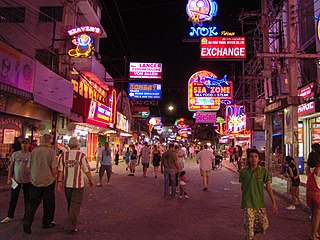
Prostitution in Thailand is illegal. However, due to police corruption and an economic reliance on prostitution dating back to the Vietnam War, it remains a significant presence in the country. It results from poverty, low levels of education and a lack of employment in rural areas. Prostitutes mostly come from the northeastern (Isan) region of Thailand, from ethnic minorities or from neighbouring countries, especially Cambodia, Myanmar, and Laos. In 2019, UNAIDS estimated the total population of sex workers in Thailand to be 43,000.
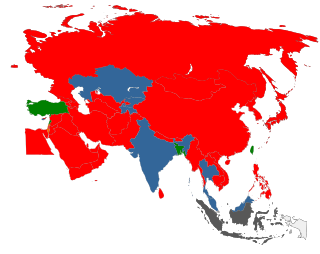
The legality of prostitution in Asia varies by country. There is often a significant difference in Asia between prostitution laws and the practice of prostitution. In 2011, the Asian Commission on AIDS estimated there were 10 million sex workers in Asia and 75 million male customers.
Prostitution in Singapore in itself is not illegal, but various prostitution-related activities are criminalized. This includes public solicitation, living on the earnings of a prostitute and maintaining a brothel. In practice, police unofficially tolerate and monitor a limited number of brothels. Prostitutes in such establishments are required to undergo periodic health checks and must carry a health card.
Prostitution in Guatemala is legal but procuring is prohibited. There is an offence of “aggravated procuring” where a minor is involved. Keeping a brothel is not prohibited.

Prostitution in Pakistan is a taboo culture of sex-trade that exists as an open secret but illegal. Prostitution is largely based in organisational setups like brothels or furthered by individual call girls.
Prostitution is not illegal in Sri Lanka, however, related activities such as soliciting, procuring, and brothels are outlawed. It is also illegal to traffic persons for prostitution, especially minors. Prostitution is not as widespread in Sri Lanka as in some neighbouring countries. It is estimated that there are 40,000 prostitutes in the country, and nearly half of them operate in Colombo.
Prostitution in Trinidad and Tobago is legal but related activities such as brothel keeping, soliciting and pimping are illegal.
Prostitution in Indonesia is legally considered a "crime against decency/morality", although it is widely practiced, tolerated and even regulated in some areas. Some women are financially motivated to become prostitutes, while others may be forced by friends, relatives or strangers. Traditionally, they have met with customers in entertainment venues or special prostitution complexes, or lokalisasi (localization). However, recently internet forums and Facebook have been used to facilitate prostitute-client relations. In recent years, child sex tourism has become an issue at the resort islands of Batam and Bali.
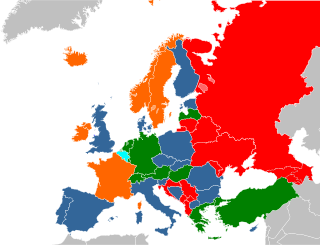
The legality of prostitution in Europe varies by country.
Prostitution in Rwanda is illegal in all aspects. Prostitutes, clients and any involved third parties are criminalised by the country's Penal Code. However, a draft of a new Penal Code that does not prohibit prostitution was presented for debate in the Rwandan Parliament in December 2017.

The legal status of prostitution in Africa varies widely. It is frequently common in practice, partially driven by the widespread poverty in many sub-Saharan African countries, and is one of the drivers for the prevalence of AIDS in Africa. Senegal and Côte d'Ivoire permit the operations of brothels. In other countries, prostitution may be legal, but brothels are not allowed to operate. In some countries where prostitution is illegal, the law is rarely enforced.
Prostitution is illegal in Maldives, but occurs on a small scale. A 2014 survey by the Human Rights Commission of the Maldives (HRCM) estimated there were 1,139 female prostitutes on the islands. Some women enter the country posing as tourists but then engage in sex work.
Prostitution in Botswana is not illegal, but laws such as public disorder, vagrancy, loitering and state recognised religious provisions are used to prosecute prostitutes. Related activities such as soliciting and brothel keeping are illegal. Botswana has made proposals to make prostitution legal to prevent the spread of AIDS. However, there has been mass opposition to it by the Catholic Church. Prostitution is widespread and takes place on the street, bars, hotels, brothels and the cabs of long-distance trucks.
Prostitution in Malawi is legal and prevalent around hotels and bars in urban and tourist areas. Living off the proceeds of prostitution is illegal. In 2015, it was estimated there were 20,000 sex workers in the country.
Prostitution in South Sudan is legal but related activities such as soliciting or brothel-keeping are illegal.
Prostitution in Hawaii is illegal but common. There are about 150 brothels in Oahu alone.
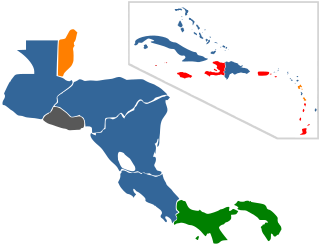
Legality of prostitution in the Americas varies by country. Most countries only legalized prostitution, with the act of exchanging money for sexual services legal. The level of enforcement varies by country. One country, the United States, is unique as legality of prostitution is not the responsibility of the federal government, but rather state, territorial, and federal district's responsibility.
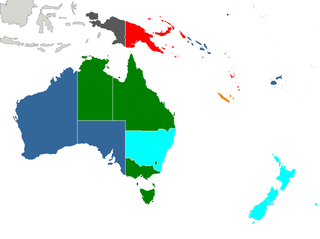
Prostitution in Oceania varies greatly across the region. In American Samoa, for instance, prostitution is illegal, whereas in New Zealand most aspects of the trade are decriminalised.
Prostitution in Fiji is legal, but most activities connected with it are illegal: brothel keeping, pimping and buying or selling sex in public. Street workers make up the bulk of Fiji's prostitutes. Many of the prostitutes are Asian, especially Chinese that provide sexual services for the growing number of tourists arriving in the country and also locals. Some come into the country on student visas. In 2014, it was estimated that there were 857 sex workers in Fiji. Even though buying and selling sex in public is illegal in Fiji, police have no legal authority to arrest prostitutes without an official report being lodged for the police to take action.
The British Overseas Territories (BOT) or alternatively, United Kingdom Overseas Territories (UKOTs), are 14 territories under the jurisdiction and sovereignty of the United Kingdom. They are the parts of the British Empire that have not been granted independence or have voted to remain British territories. These territories do not form part of the United Kingdom. Most of the inhabited territories are internally self-governing, with the UK retaining responsibility for defence and foreign relations. The rest are either uninhabited or have a transitory population of military or scientific personnel.
References
- ↑ "HIV, Ethics and Human Rights Review of legislation of Solomon Islands" (PDF). UNDP. March 2009. Retrieved 8 February 2018.
- ↑ "Legal environments, human rights and HIV responses among sex workers in Asia and the Pacific" (PDF). UNDP Asia-Pacific Regional Centre. August 2011. Retrieved 8 February 2018.
- ↑ "Incidences of Prostitution in the Solomon Islands". Solomon Times Online. 25 May 2010. Retrieved 8 February 2018.
- 1 2 "Poverty forcing Solomons girls into prostitution". ABC News. 1 August 2012. Retrieved 8 February 2018.
- 1 2 "Teenage girls in Solomon Islands pushed into prostitution". Radio Australia. 1 August 2012. Retrieved 8 February 2018.
- ↑ "The Legal Status of Prostitution by Country". ChartsBin. Retrieved 8 February 2018.
- 1 2 3 4 "Solomon Islands 2017 Trafficking in Persons Report". U.S. Department of State. Archived from the original on 3 July 2017. Retrieved 8 February 2018.
 This article incorporates text from this source, which is in the public domain .
This article incorporates text from this source, which is in the public domain . - ↑ "Laws of Solomon Islands Penal Code" (PDF). Pacific Constitutions Research Network. Archived from the original (PDF) on 9 February 2018. Retrieved 8 February 2018.
- ↑ "Solomon Islands Markets Profile" (PDF). Partners to Improve Markets (PIM). UN Women. 2009.
- ↑ Inifiri, Jeremy (27 August 2014). "Police on prostitution". Solomon Star. Archived from the original on 11 September 2016. Retrieved 31 August 2016.
- ↑ "Solomons opposition chides PM for attacks on RAMSI". Radio New Zealand. 17 November 2006. Retrieved 8 February 2018.
- ↑ "RAMSI rejects Solomons prostitute claims". The Age. 15 November 2006. Retrieved 8 February 2018.